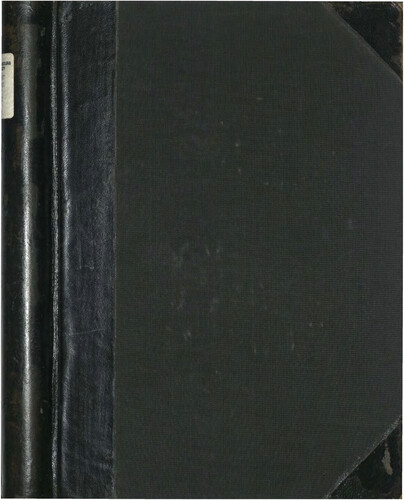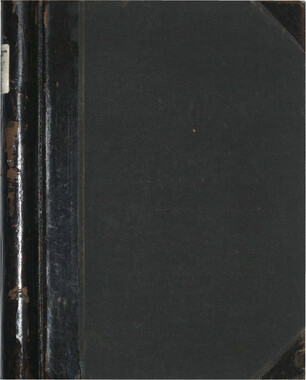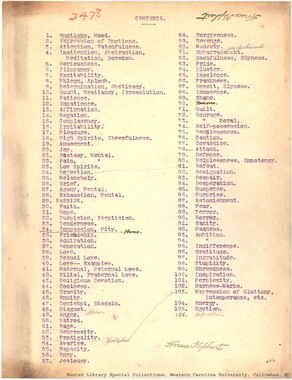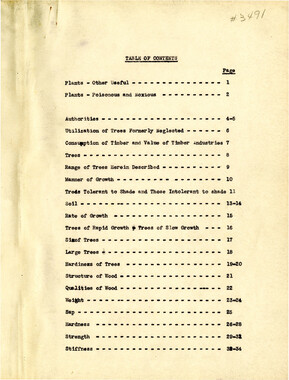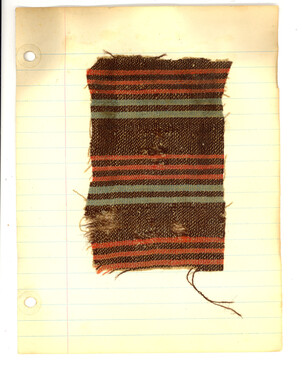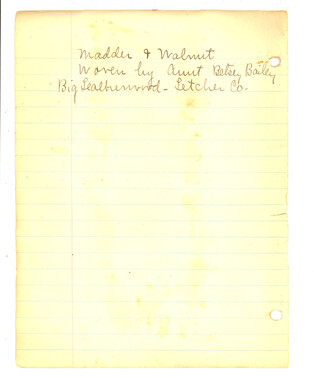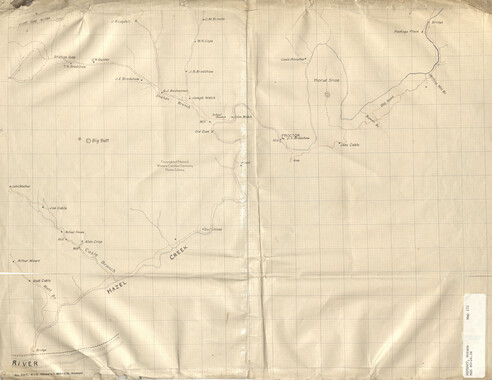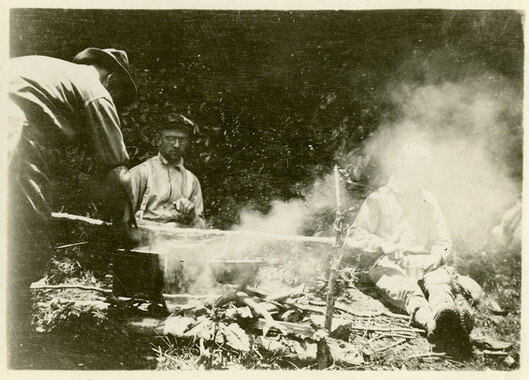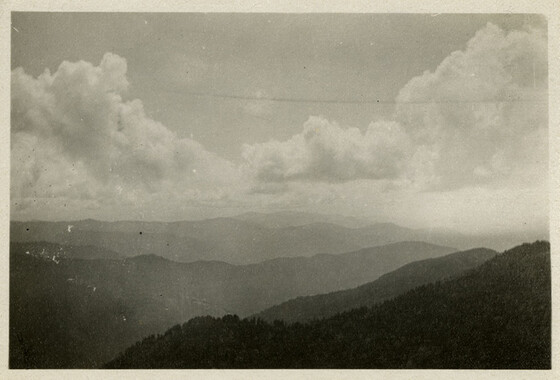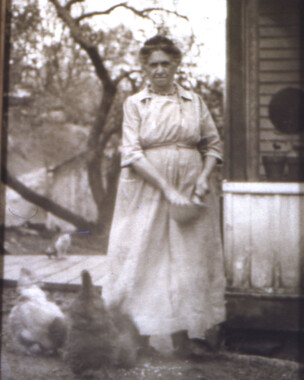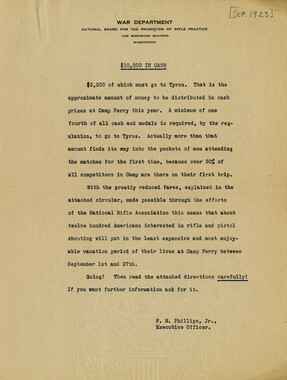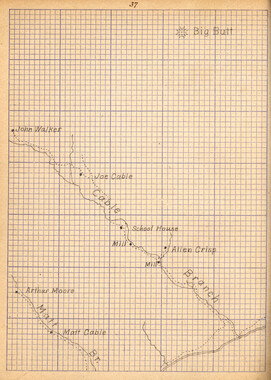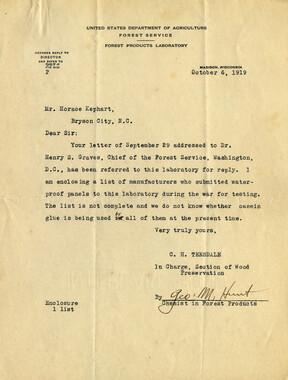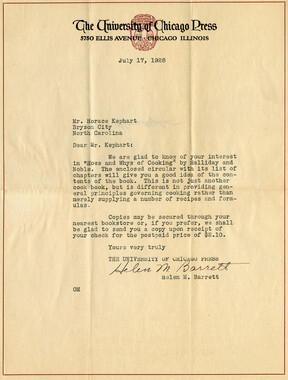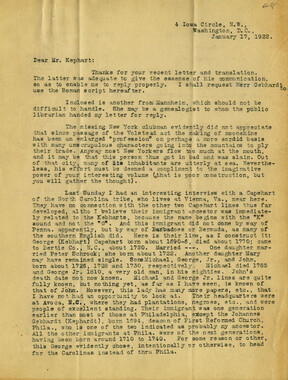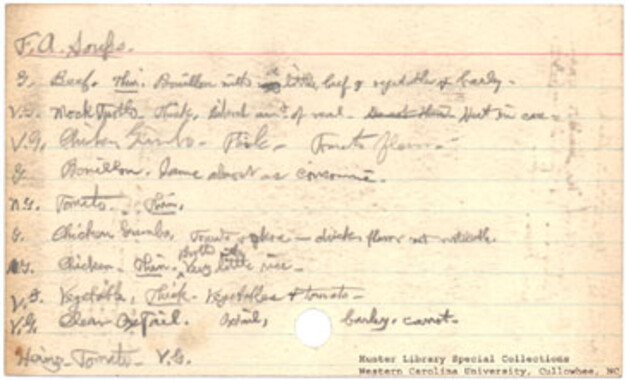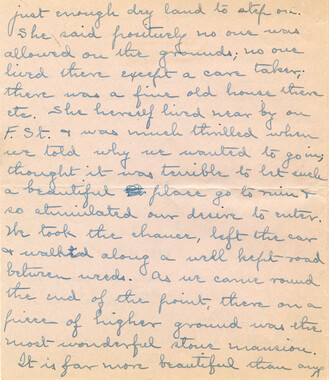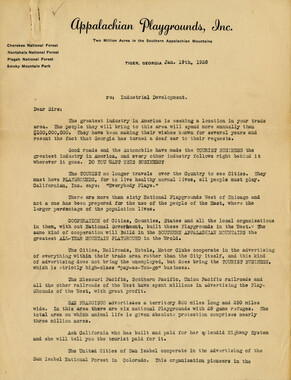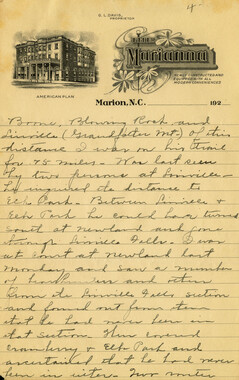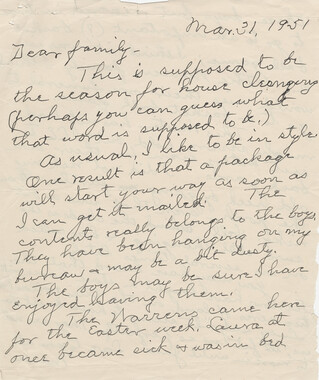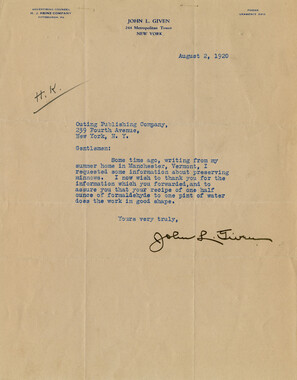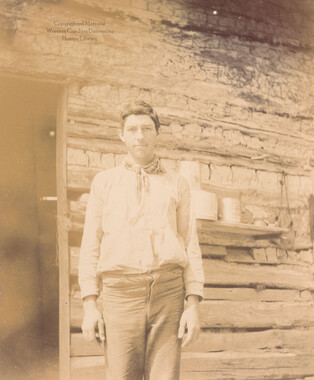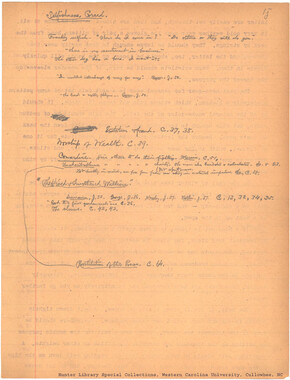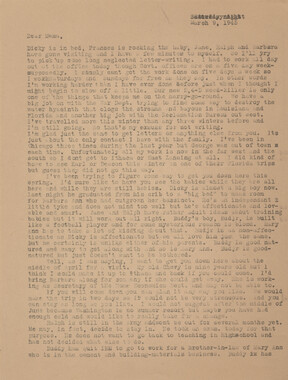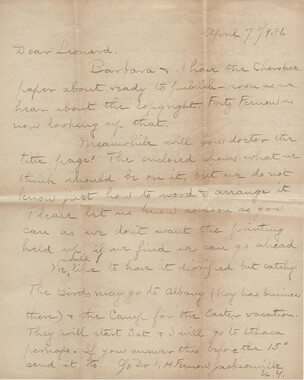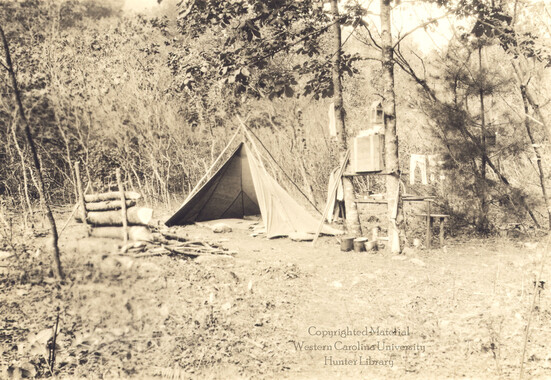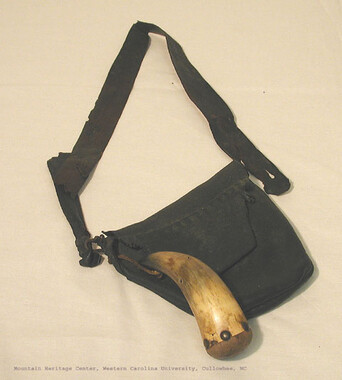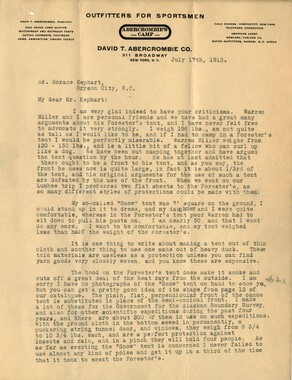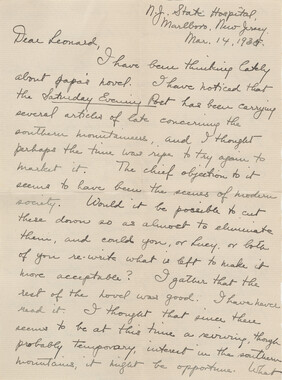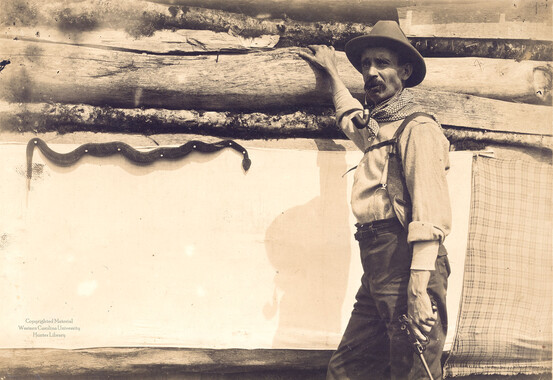Western Carolina University (20)
View all
- Canton Champion Fibre Company (2308)
- Cherokee Traditions (293)
- Civil War in Southern Appalachia (165)
- Craft Revival (1942)
- Great Smoky Mountains - A Park for America (2767)
- Highlights from Western Carolina University (430)
- Horace Kephart (941)
- Journeys Through Jackson (154)
- LGBTQIA+ Archive of Jackson County (24)
- Oral Histories of Western North Carolina (314)
- Picturing Appalachia (6772)
- Stories of Mountain Folk (413)
- Travel Western North Carolina (160)
- Western Carolina University Fine Art Museum Vitreograph Collection (129)
- Western Carolina University Herbarium (92)
- Western Carolina University: Making Memories (708)
- Western Carolina University Publications (2283)
- Western Carolina University Restricted Electronic Theses and Dissertations (146)
- Western North Carolina Regional Maps (71)
- World War II in Southern Appalachia (131)
University of North Carolina Asheville (6)
View all
- Kephart, Calvin, 1883-1969 (15)
- Kephart, Horace, 1862-1931 (290)
- Kephart, Laura, 1862-1954 (39)
- Masa, George, 1881-1933 (1)
- Thompson, James Edward, 1880-1976 (1)
- Weaver, Zebulon, 1872-1948 (3)
- Allanstand Cottage Industries (0)
- Appalachian National Park Association (0)
- Bennett, Kelly, 1890-1974 (0)
- Berry, Walter (0)
- Brasstown Carvers (0)
- Cain, Doreyl Ammons (0)
- Carver, George Washington, 1864?-1943 (0)
- Cathey, Joseph, 1803-1874 (0)
- Champion Fibre Company (0)
- Champion Paper and Fibre Company (0)
- Cherokee Indian Fair Association (0)
- Cherokee Language Program (0)
- Crittenden, Lorraine (0)
- Crowe, Amanda (0)
- Edmonston, Thomas Benton, 1842-1907 (0)
- Ensley, A. L. (Abraham Lincoln), 1865-1948 (0)
- Fromer, Irving Rhodes, 1913-1994 (0)
- George Butz (BFS 1907) (0)
- Goodrich, Frances Louisa (0)
- Grant, George Alexander, 1891-1964 (0)
- Heard, Marian Gladys (0)
- Laney, Gideon Thomas, 1889-1976 (0)
- McElhinney, William Julian, 1896-1953 (0)
- Niggli, Josephina, 1910-1983 (0)
- North Carolina Park Commission (0)
- Osborne, Kezia Stradley (0)
- Owens, Samuel Robert, 1918-1995 (0)
- Penland Weavers and Potters (0)
- Rhodes, Judy (0)
- Roberts, Vivienne (0)
- Roth, Albert, 1890-1974 (0)
- Schenck, Carl Alwin, 1868-1955 (0)
- Sherrill's Photography Studio (0)
- Smith, Edward Clark (0)
- Southern Highland Handicraft Guild (0)
- Southern Highlanders, Inc. (0)
- Stalcup, Jesse Bryson (0)
- Stearns, I. K. (0)
- United States. Indian Arts and Crafts Board (0)
- USFS (0)
- Vance, Zebulon Baird, 1830-1894 (0)
- Western Carolina College (0)
- Western Carolina Teachers College (0)
- Western Carolina University (0)
- Western Carolina University. Mountain Heritage Center (0)
- Whitman, Walt, 1819-1892 (0)
- Wilburn, Hiram Coleman, 1880-1967 (0)
- Williams, Isadora (0)
- 1880s (10)
- 1890s (29)
- 1900s (8)
- 1910s (138)
- 1920s (219)
- 1930s (33)
- 1940s (35)
- 1950s (15)
- 1600s (0)
- 1700s (0)
- 1800s (0)
- 1810s (0)
- 1820s (0)
- 1830s (0)
- 1840s (0)
- 1850s (0)
- 1860s (0)
- 1870s (0)
- 1960s (0)
- 1970s (0)
- 1980s (0)
- 1990s (0)
- 2000s (0)
- 2010s (0)
- 2020s (0)
- Appalachian Region, Southern (43)
- Blount County (Tenn.) (1)
- Buncombe County (N.C.) (5)
- Henderson County (N.C.) (1)
- Jackson County (N.C.) (6)
- Knox County (Tenn.) (2)
- Knoxville (Tenn.) (1)
- Macon County (N.C.) (1)
- Mitchell County (N.C.) (2)
- Qualla Boundary (1)
- Swain County (N.C.) (88)
- Asheville (N.C.) (0)
- Avery County (N.C.) (0)
- Cherokee County (N.C.) (0)
- Clay County (N.C.) (0)
- Graham County (N.C.) (0)
- Great Smoky Mountains National Park (N.C. and Tenn.) (0)
- Haywood County (N.C.) (0)
- Lake Santeetlah (N.C.) (0)
- Madison County (N.C.) (0)
- McDowell County (N.C.) (0)
- Polk County (N.C.) (0)
- Rutherford County (N.C.) (0)
- Transylvania County (N.C.) (0)
- Watauga County (N.C.) (0)
- Waynesville (N.C.) (0)
- Yancey County (N.C.) (0)
- Artifacts (object Genre) (85)
- Clippings (information Artifacts) (15)
- Envelopes (37)
- Glass Plate Negatives (5)
- Letters (correspondence) (366)
- Manuscripts (documents) (273)
- Maps (documents) (3)
- Memorandums (1)
- Photographs (195)
- Portraits (1)
- Postcards (5)
- Publications (documents) (6)
- Aerial Photographs (0)
- Aerial Views (0)
- Albums (books) (0)
- Articles (0)
- Biography (general Genre) (0)
- Cards (information Artifacts) (0)
- Crafts (art Genres) (0)
- Depictions (visual Works) (0)
- Design Drawings (0)
- Drawings (visual Works) (0)
- Facsimiles (reproductions) (0)
- Fiction (general Genre) (0)
- Financial Records (0)
- Fliers (printed Matter) (0)
- Guidebooks (0)
- Internegatives (0)
- Interviews (0)
- Land Surveys (0)
- Minutes (administrative Records) (0)
- Negatives (photographs) (0)
- Newsletters (0)
- Newspapers (0)
- Occupation Currency (0)
- Paintings (visual Works) (0)
- Pen And Ink Drawings (0)
- Periodicals (0)
- Personal Narratives (0)
- Plans (maps) (0)
- Poetry (0)
- Programs (documents) (0)
- Questionnaires (0)
- Scrapbooks (0)
- Sheet Music (0)
- Slides (photographs) (0)
- Sound Recordings (0)
- Specimens (0)
- Speeches (documents) (0)
- Text Messages (0)
- Tintypes (photographs) (0)
- Transcripts (0)
- Video Recordings (physical Artifacts) (0)
- Vitreographs (0)
- Horace Kephart Collection (729)
- A.L. Ensley Collection (0)
- Appalachian Industrial School Records (0)
- Appalachian National Park Association Records (0)
- Axley-Meroney Collection (0)
- Bayard Wootten Photograph Collection (0)
- Bethel Rural Community Organization Collection (0)
- Blumer Collection (0)
- C.W. Slagle Collection (0)
- Canton Area Historical Museum (0)
- Carlos C. Campbell Collection (0)
- Cataloochee History Project (0)
- Cherokee Studies Collection (0)
- Daisy Dame Photograph Album (0)
- Daniel Boone VI Collection (0)
- Doris Ulmann Photograph Collection (0)
- Elizabeth H. Lasley Collection (0)
- Elizabeth Woolworth Szold Fleharty Collection (0)
- Frank Fry Collection (0)
- George Masa Collection (0)
- Gideon Laney Collection (0)
- Hazel Scarborough Collection (0)
- Hiram C. Wilburn Papers (0)
- Historic Photographs Collection (0)
- Humbard Collection (0)
- Hunter and Weaver Families Collection (0)
- I. D. Blumenthal Collection (0)
- Isadora Williams Collection (0)
- Jesse Bryson Stalcup Collection (0)
- Jim Thompson Collection (0)
- John B. Battle Collection (0)
- John C. Campbell Folk School Records (0)
- John Parris Collection (0)
- Judaculla Rock project (0)
- Kelly Bennett Collection (0)
- Love Family Papers (0)
- Major Wiley Parris Civil War Letters (0)
- Map Collection (0)
- McFee-Misemer Civil War Letters (0)
- Mountain Heritage Center Collection (0)
- Norburn - Robertson - Thomson Families Collection (0)
- Pauline Hood Collection (0)
- Pre-Guild Collection (0)
- Qualla Arts and Crafts Mutual Collection (0)
- R.A. Romanes Collection (0)
- Rosser H. Taylor Collection (0)
- Samuel Robert Owens Collection (0)
- Sara Madison Collection (0)
- Sherrill Studio Photo Collection (0)
- Smoky Mountains Hiking Club Collection (0)
- Stories of Mountain Folk - Radio Programs (0)
- The Reporter, Western Carolina University (0)
- Venoy and Elizabeth Reed Collection (0)
- WCU Gender and Sexuality Oral History Project (0)
- WCU Mountain Heritage Center Oral Histories (0)
- WCU Oral History Collection - Mountain People, Mountain Lives (0)
- WCU Students Newspapers Collection (0)
- Western North Carolina Tomorrow Black Oral History Project (0)
- William Williams Stringfield Collection (0)
- Zebulon Weaver Collection (0)
- Appalachian Trail (6)
- Forest conservation (2)
- Forests and forestry (5)
- Great Smoky Mountains National Park (N.C. and Tenn.) (18)
- Hunting (7)
- Maps (2)
- Mines and mineral resources (3)
- Postcards (1)
- World War, 1939-1945 (4)
- African Americans (0)
- Artisans (0)
- Cherokee art (0)
- Cherokee artists -- North Carolina (0)
- Cherokee language (0)
- Cherokee pottery (0)
- Cherokee women (0)
- Church buildings (0)
- Civilian Conservation Corps (U.S.) (0)
- College student newspapers and periodicals (0)
- Dams (0)
- Dance (0)
- Education (0)
- Floods (0)
- Folk music (0)
- Forced removal, 1813-1903 (0)
- Gender nonconformity (0)
- Landscape photography (0)
- Logging (0)
- North Carolina -- Maps (0)
- Paper industry (0)
- Pottery (0)
- Railroad trains (0)
- Rural electrification -- North Carolina, Western (0)
- School integration -- Southern States (0)
- Segregation -- North Carolina, Western (0)
- Slavery (0)
- Sports (0)
- Storytelling (0)
- Waterfalls -- Great Smoky Mountains (N.C. and Tenn.) (0)
- Weaving -- Appalachian Region, Southern (0)
- Wood-carving -- Appalachian Region, Southern (0)
- StillImage (296)
- Text (647)
- MovingImage (0)
- Sound (0)
Horace Kephart Journal 22
-
Horace Kephart (1862-1931) was a noted naturalist, woodsman, journalist, and author. In 1904, he left St. Louis and permanently moved to western North Carolina. Living and working in a cabin on Hazel Creek in Swain County, Kephart began to document life in the Great Smoky Mountains. He created 27 journals in which he made copious notes on a variety of topics. Journal 22 (previously known as Journal XII) includes information on characteristics of people in general. Click the link in the Related Materials field to view a table of contents for this journal.
-
-
• PRISSIO 0 O!IO s • • , ATTEN ION, ATCHFUL SS . ~ ~itPJ~· a ~ . 1 . ..:..:io..;:t;......4.. M· .l..,,...l -~~ 6 FLIPPANCY . 7 EXCITABILITY. PHLEG . ~· 1i ~~ 014 ~ ,_.~ .,4.._;&--~ ]4. ~ 1%- ...d£-~. ~ ~ ~ ~ ~ ...dL 1 ~. D T I ATION, OBSTINACY. ~,L.,.-~. ~r:t.~j ~'Sif~~· C£iak~. ~ H c.k.~. DOUBT, HESITANCY, IRRESOLUTION. II PATIENCE . IMPATIENCE. AFF!Rl ATION . ~. GATION. ~~~./~ COMPLAC NCY. 16 IRRITABILITY. IJ PLEASURE. HIGH SPI ITS, CHE RFUL •S . • "And since neither Janus nor Chronos nor I Can hinder the crimes Nor mend the bad times It's better to laugh than to cry." li 19 AMUS tNT . fhrr-1. _,ttn.:k. t(~ ~. JOY . ECSTASY, Mental. PAIN • • LOY SPIKI!S. DEJ CTIO • "In the lives of eaoh one of us, as we look back ard and review them in retrospect, there are certain desert wastes from which memory winces like some tired traveller faced with a dreary stretch of road. Even from the security of later happiness we cannot contemplate them without a shudder. Time robs our sorrows of their sharp vividness, but the horror of those blank 1 gray days never wholly passes. It remains for ever at the back of our consciousness to remind us that~ though we may have struggled through it to the heights, there is an abyss. We may dwell, like the Pilgrim 1 on the Delectable Mountains, but we never forget the Slough of Despond. Years after ards, Jill could not bring herself to think of that brief but age-long period which lay between the evening when she read Derek 1s letter and the morning when, with the wet sea-wind in her face and the cry of the wheeling sea-gulls in her ears, she stood on the deck of the liner that was taking her to the land where she could begin a new life. It brooded behind her like a great, dank cloud, shutting out the sunshine." (Wodehouse, The Little Warrior, 129.) LA1TCHOLY. (t ;Ja., vU.. .-:1: ~ : u.,._~ .L'~ ... 'UN<- -fw-'- A ~ ... t;t- ~-~oW>- ! (t ~"- veL, .uL-~: u....~J.:~, ~~..tt,~ ... ~t-~-~·'" (Q~, ~- ~~/,;...... ~'m.~~ ~-) GRIEF. AGONY, ent 1. EXHAU TION, NTAL . PASSION . Definition .- Passion consists in t11e ef ectc produc d on the spectator ' s emot onal nature as his sympathy follo~s the characters tliTough the inc dents of the plot; it is war as distinguished from Kriegspiel . toulton, l86 . Devices or ~ntensiryine tl1e atrain .-MoU1ton, l91 , 196-7 . ;;o FAITH . I HOPE . SUSPICION, SC~PTICIS .~./.TOPICS OF THE TIMES. 7~ ~ hrly lli ~um~ Both Sides tat' a Itt ta not a happy Offended on I At any rat It t by t=alrneu. uot an aay on , :tor b , a mll18'1Y more than anybody 1 , Is oxpooell to att&ek trum both altl In 11ny war, actual or m~taphorlcal, tha.t Ia goln1r on. It b among tht• common t-ru1tl ll&tld f his llllrlen~ 1 to b charged by ev.dt ot ha antac-onlsts with tavotlng an•l aorvtnc tho oth r, and h Is lucky tr thr. ac:cueatlon 11 not o.ccompanh tl b)' lfrnl 1 euggftlltlona Utat the tavorlntr and a rvJnc ar dono tor 11. prko 11 ld by th tlendl9h foe. l'ln Jy lllu tratlng thla p cullarlty of the journallstlo lot 111 a I ttcr just r • celv d trom a r ador o! 'l'ur. TlM~a whtl a.nnouncea that tor a. W'hllo ho 1 to b a reader. • 'ow, u ually, wh n ,a IUbscrlb r fflela mov d to tho de p rn.te mmumro of stopping hi pnpct'-thn t ulthnatP. f< rm or <'<•Jttl••mn tl .,, nd llllll lshn nt It 111 h u c .,r <lin• roem nt "llh otllnlou r pre ~"<1 on t.h• P.dlt rial paao. 0WecU11u. to liL1r and ~Jllilll.l't!Jil ~· TENDERNESS . • COMPASSION, PITY . Home_ _ Home is the place where your everyday clothes are, and where some-body, or something needs you. ~· _../. L~ r.;~ . .A-u-.~.,;-1 ,!I., r· 3J6:J "Then, Rob rt. on, you know what happened. I got sick of it. I began feeling homesick; I wa~m't home~ick for you, nor for anybody else, but just for ew York, and for this old tenement down here. Som way, I couldn't keep my mind off it; and all of a sudden I woke up to why that was; it's bccausr it'~ home to me; it's b<· cause I belong herr; because I've friends here who care for m , people who don't car a damn if 1 am a loafer and hate work, people I could sometimes do a hand's turn for, for all of my being a down and outer. That's all. l just came ha k." (~~~- &~-~·,J-t-ft.t..,f.l-'-7·) RI NDSHIP . FRIENDS THE GREATEST NEED Paator Tella of Woman Who Preferred Slum• to Solitude. The ltc\', Dr. );'rank 0. Jlall, paatOI' ol t hn Unlv rsallat ::bur h of the Dh loe l'a· t~rnlt •, preached In that !lurch · sterday a. aennon ou " So lal Ju.tlcc," the first or a 11 rl t1 arran&' a In Union Bcrv· Ices by Dr. Bt pben s. Wille, rabbi of the l!"r~" Synagcgu , and Dr. Joba llaynes Jlolmcs, Unitarian, .. 'l'hl'ro 111 alway& an 'If' in friendship I twnys ondltlOnll that lftUIIt b tnet IJ p opl are tu be and to r maln trl ml • he said. " Jt Js a good thins to be rich, ' 11nd n. good thing to be atrons. but It Is a l•ettor thin~ to be belov d by mQ.ItY frl nds," R&ld 11lu'l'lpldel. .. A while ago aomo charltablfl P opln took pity on a poor woman with man~· 11mall chlltlr n who wu living Itt want ami ~qm~tm· In a mlanrablo hmetnf!nt ot our city. 'l'h l' r und a little boue In the I country fnmlshrd It, I!UPPlled It with the nccc&~lt\eM or llff', and with cr@at antlcl· lpaUon8 plo••e•l the oman and children th rn wh ro the)' might bnvo th lr own l•nn1o' frco tro111 the nola and dirt of thll ell), with npr>nrtunltY' for the chlldr n t'o pta.y out doors 1\1111 keep well. nut In a ftow w ks th ) found the house d rt d. 'l'hll woman ha.l fl"d with her broOd hank to th• t•ltv 11h1m ~he 1<ald: 'I alwava rlld llkf\ I'OOPlll bPtter than 11tump•.' lf the truth bo tolol, Wll nil do "• r "'ouhl ra.'.hct· u,·c on a. lamppost In Nf'W York City.' s~tlll n. frlrnd of mlno, • than to llvo nlono In tho most haxurlou• 11uburl.lan mansl<m that wa11 over built.' In that he wu _r_lgh_t_:~· --~----- Nothing remained for me then but to grin and bear it, and bide my time. That I had friend of my own was to me a source of that kind of consolation which is largely pride. antyre and th Coningsbys, Regina Barry and her mother came clo. er to me now than anyone with whom I had ties of blood. "Our relatives," George Sand write somewhere, "ar the fdends ~tiven us by Natur ; our fri<'nds are the relatives given us by God." As relatives given m by God I r<>garded Lovey and hristian and olonel Straight and Pyn and Beady Lamont and all that band of humble, helpful pals to whom I was knit in the bonds or the "robust love" which was the atmosphere o( brave old Walt Whitman's City of Friends. There was no pose among them, nor condemnation, nor severity. Forgiveness was exercised there till st'Vl'nty limes s v n. They forbore one another in lov<>, and <>nd<> avorcd to keep the unity of the spirit in the bond of p<'ace to a degree or which Someone would have said that II<> had not found the like, no, not in Isra 1. My family were all of Israel, and of th strictest s ct. They fasted twice in the week, so to speak; in theory, if not in practice, they gave tithes of all that they posses ed; they could sine rely thank God that they were not as such men nfl compos d tho Down and Out; and yet it was pr cisely among those who smote their breasts and didn't dare so much as to lift up their eyes unto h aven that I found tho flympathy that raised me to my feet and bade me be a man. No wonder, then, that that evening I kept poor old Levey n<>ar me, that I took him down to the caf~, whore there wer only men, and made him dine with me and tQld him of my bereavement. LOYALTY. TREACHERY. J: £. -n,.,J-. Mischief Makers J- '/:z' THE crime of tr a on is mor ommon than m n . uppose, for n arbitrary definition written in statute books cannot make le treasonable tho. e disloyal cts of which the statute takes no account. If the law should define th ft as th wrongful taking and carrying away of anoth r's purse, would the culprit who I ft the purse and mad off with its cont nts be I . a thief? In America tr ason is defined as levying war against the Unit d States, adhering to th ir en mies or giving their en mies aid and comfort. This d finition is arbitrary and wholly inadequate. A b tter definition, and one that more accurately m shes with the common understanding of mankind- the proper t st of d finitions - i that giv n in th work named Britton, whose authorship is lost in the mist of England's yesterdays. Here we are told that tr ason is "any mischief don to one to whom the doer represents himself as a friend." Treason, th n, is a mischi f done in violation of prof!:' ss d friendship an act of disloyalty to one to whom allegiance is due by reason of friendly pr tensions. If t'lectl'd official , by reason of stupidity or indifT renee, waste the mon y intrust d to them by th p opll', they work a mischief under cover of prof s d fril:'ndship. To say that th y violate a trust does not xpr !IS the whole of th ir off ' ns . To waste tax mon y is to I vy another and unnec ssary tax; to make war upon the purs s of th people; to give aid and comfort to the nemy, which is the hard necessity that requires men to sweat for their bread. If a public servant uses the advantage of his office to get a profit by dealing in commodities the people must buy and by reason of his activities the price of these commodities is increased, he is a traitor in spirit and in fact. His clear intent is to fatten his own purse by doing the people a mischief. He not only delivers the people into the hands of an enemy but shares the enemy's profit. One who is set to guard a gate and for a price opens it to the barbarians is not guilty of a greater treachery. If a number of men conspire to increase the price of a necessity or conspire in any enterprise that inevitably will increase the price of a necessity and work hardship upon the people, their action is treasonable. They are not traitorous to the king, for there is no king; but they are traitorous to the whole people, who are the state. These men, with other citizens, are partners in the enterprise of government. The partnership supposes a common cause. It does not forbid the taking of profits in exchange for service, for one may serve his friends to get a Jiving and violate no principle of honor. But it does forbid conspiracy for the purpose of extortion. Those who conspire to wrest an unjust profit from the necessity of the people do not profess enmity. To profess enmity would be to invite destruction. They operate under the guise of friendship and work a mischief that is more than a breach of allegiance, more than adherence to an enemy- that is, in short, an act of warfare in quest of spoil. We need to revise our definition of treason. Treason is not merely an act of disloyalty in time of war. This definition is the progeny of an age when kings were rulers by divine right and subjects were pawns to be sacrificed in the royal game of slaughter. Peace hath her treacheries no less infamous than war's. When war is forgotten a traitor will be a traitor still. And we must learn that the citizen of a republic, whether an official or a private citizen, is guilty of treason when he violates the confidence of the whole people, who are the state, and does them a mischief. ADl.IRATION. ~f,.;Y, ~~,A~~~~~~-~~. VENERATION. I ·'I LOVE . "Into her mind, never far distant from it, came the thought of Derek. And, suddenly, Jill made another discovery. She was thinking of Derek, and it as not hurting. She was thinking of him quite coolly and clearly and her heart was not aching. She sat back and screwed her eyes tight, as she had always done when puzzled. Something had happened to her, but how it had happened and when it had happened and why it had happened she could not understand. She only knew that now for the first time she had been granted a moment of clear vision and was seeing things truly. She wanted Wally. She wanted him in the sense that she could not do without him. She felt nothing of the fiery tumult which had come upon her when she first met Derek. She and Wally would oome together with a smile and build their life on an enduring foundation of laughter and happiness and good-fellowship. Wally had never shaken and never would shake her senses as Derek had done. If that as love, then she did not love Wally. But her clear vision told her that it was not love. It might be the blazing and crackling of thorne, but it was not the fire. She wanted Wally. She needed him as she needed the air and the sunlight." (Wodehouse, The Little Warrior,359.) "'Is it wrong to tell a pretty woman you admire her?' 'Under our circumstances, yes.• He twisted himself around in the seat and eat looking at her. 'The loveliest mouth in the world!' he said, and kissed her suddenly. She had expected it for at least a week, but her surprise was well done. Well done also was her silence during the homeward ride. No, she was not angry, she said. It was only that he had set her thinking. When she got out of the car, she bade him good-night and good-bye. He only laughed. 'Don't you trust me7 1 he said, leaning out to her. 'It is not that. I do not trust myself.' After that nothing could have kept him a ay, and she knew it. 'Man demands both danger and play; therefore be selects woman as the most dangerous of toys.• A spice of danger had entered into their relationship. It bad become infinitely piquant." (K., by Mary Roberts Rinehart, 170.) RO!LANTIC LOVE . I' DorothyDix ~/iss ixteen Is Advenfttrous, Romantic, Trusting of !rangers, Dissatisfied With Pare11tial Control, Eager for Strange New Thrills- Is It Any Wonder Sweet Si:xteen of nL Is uThe Dangero t ge" for Girls? 11 11 I ud '\ oret thin IF1 tAgn or th sarn<' ett!rnal prisl<lon: and ft r. Or ahr m k<•a som 11 r h l•l'in g H Pll} a.n<l fortunat at<'h rl1UII!ag bctw n DO O'T'TIX D • TOWN OF TY, NORTH CAROLINA LOVE. (The Saunterer, to 'Mary: ) "Love is indeed the greatest thing in the world, for it has th greatest power for either good or evil. Love exalted is heroic. True love is unselfish, sacrifices self for the loved one's sake. But there is another kind.- "! have seen a refined and adorable woman look fondly into her lover•s eyes, with the artle s sincerity of an angel, and lie, lie, lie. ~ "I have seen the pattern of a ~en i , guest in a comrade's home, take by stealth from that bosom friend his most precious je el, use her as a pawn, and dr g his friend's honor in the dirt. "Common love, selfish love, hen balked but yet goaded on, will commit ny treachery or crime. It will steal, it will bear false witness, it will covet a neighbor's m te, it will commit a ultery, it will dishonor a father and a mother, it will do murder,~ J it ill curse God." ~ J ••• UNREQUITED LOVE.-- "Rejected suitors take to roaming as naturally as unhived bees." (Hardy, Return of the Native.) ----------------------------------- ------ Falling In Love - By Dr. FRANK CRANE ~ F lling in lo~e is one of the Jn countable phenomena o.1 the human race. The Orientals explain it by claiming that we have hacl a previoua existence and that those in the present existence touc~ us who have some hold on us due to a life that is past. • Whether we accept this explan~tion or not there is no doubt that falling in love is one of the inexplicable peculiaritie~~ of our race. It is connected also with the creative instinct and it is safC!I to say that those who are not capable of falling in love with anything are not capable of creative work either in the liber~ arts or elsewhere. · It is a well known fact that many famous men. have bee._ reputed famous lovers; this h s been set down in their disfavot' ns proving that they were loose morally when, a11 a matter oE fact, morals had nothing to do with it. Love was simply an essential demand of their nature.. They had to be in love with something in order to do their best work. Much of the vagaries of those who have a<"hieved f m«:~ can be thus explained. ' Jt is not that they lack a sense of the respon ibilities of life. or that they are not willin<7 to undert ke them, but that they; need for their 11u tenance n enthusi sm that is only bred in the~ by the presence of affection. It is a mistake to think that any person is too old to need the fire given him by love. While ther is life there is love, or should be. It is well for those who are upremely endowed with tho capacity for affection, if they are endowed al o with those moral inhibitions which prevent them from indulging their capacity in forbidden directions. It would be well al11o for the friends of great men to re~ member this need of their nature and to feed it properly. No one can exist in a constant atmosphere of negation, and fire that is suppressed in one direction will break out in another. ('opyrlght, 1~24 , "''Tho lure Tc'l\.!lJlll.Jll'r Sy nd i<' lt _~> _ _ '0 'N 'AJ.I:J NOSA~B .l~V'Hd3}.t 3~V'~OH LOV • 38b2. "Th t mn d ~robl m o self-sacrifice! Ho much cl 1m ha men upon ach other? What did ohil r n gain who s orificed their lives for their parents? It aa supposed to bring them nobility; but, t the same tim , idn't it v lop in th parents the utmost callous s lfishness; didn't the latter, as their needs were e elusively consulted, grow more xacting, unreasonabl ? s not love itself the most unreason-ble and exacting thing imaginable? Once surrendered to it, the tyranny of a beloved subject wa absolute: Lee tol himself that the emotion he was considering -- the most sacred of earthly tie -- ignominiously resembled the pro erties of fly paper." (Hergesheimer, Cytherea, • Y., 1922, Knopf, 91-92.) '"This love isn't t all understood-- we are ignorant about it in spite of endless expari nee and reports and poetry. Take us before e re married, Whlle we were engaged, we had an impracticable romantic attr ction for ach other. I know that I thought of you all the time, day an night; and, just because you existed, the whol world w s full of prismatic colors; it was as though an orchestr were laying continually and I ere floating on the 'inest mu io. You re lik a figure in heaven that dre me up to you. 11, th t lasted quite while into our marriage; at first I had an even reater emotion. Then, as Helena and Gregory were born, it changed. I don't say it deere sed, F nny, that it lost any of its importance; but it di change; and in you as ell as m • It a n•t as prismatic, musical, and there's no use contradicting m . I can explain it best for myself by saying that my feelin for you bee me larg ly tenderness.' "'Oh!" Fanny exclaimed, in a little lifting gasp; "oh, and that ten erness," her cheeks were bright with sudden color, 'why, it is no more than pity.' "'That isn't just," he replied; "unless you ant to speak of pity at its very best. No, that won't do~ my affection for you is made of · 11 our experi noes, our liv s and emotions, together. We are tied by a thousand strings-- common disappointments and joy and sickness and hope and pain and heaven knows what else. We're held by habit, too, and convenience and the opinion of society. Certainly it is no smaller than the first,' he argued, but more to himself than ~ Fanny; 'that was nothing but a state of mind, of spirit; you can't live on music.'" (Do, 93-94.) (Stenographer:) "'But what about love, Mr. Randon7 That's hat throws me off. Some say it's the only thing in life.' 'I'm damned if I know,' he admitted. 'I hear the same thing, an I am rather inclined to believe it. But I have an idea that it is very ifferent from what most people insist; I don't think it is very useful aroun the house; it has more to "do with the pretty hat than with a dishpan. If you fall in love go after the thing itself, then; don't hesitate about tomorrow or yesterday; and, above all else, don't ask yourself if it ill last; that's immaterial.' 'You make it sound wild enough.' 'The wil er ~he better,' h insisted; 'if it is not delirious it's nothing .Q (Over.) ~f- 1 ], . 10utr geous! I n•t r ke out why you t ke it so coolly. ina Raff's a rott n 1m or 1 oman; it doesn't matter ho it' rranged. Why, • she gasped, 'she can be no more th n Peyton's mistress, no better than the om non the treet .• 'That is o,• he gree . But his follo ing que tion of the acce ted badness of mistresse n tre t- lk rs he isely ke t to hi self . ere they arker than the sh do cast by the inelastic institution of matrimony? At one time prostitutes ere greatly honored; but that had pa sed, he was convince , forever; and this, on the whole, he conclu d, as fortunat ; for, perhaps, if prostitution ere thoroughly iscredited, marriage might, in some Elysian future, be swept of most of its rubbish. Houses of prostitution, mistresses, like charity, absorbed and dissipated gre t deal of the dissatisfaction insep rable from the present misconceptions of love an society. The first move, o viously, in stopping ar, w s the suppression of such ameliorating forces as the Red Cross; and, conversely, with complete unions, infidelity ould languish and disappear . " (Do, 118-119.) "' hat dm you think woul happen if or a while e'd lose our ideas of h twas right and rong in lev ? 1 'Pandemonium,• Grove repli promptly. 'Not if people were more responsible, William,• Sav na Grove added; 'not for the superior. But then, 11 laws an order were made for the good of the mob (my Italics)-.--I~ 1 t nee the policeman I see in the streets; and, really, I haven't a scrap ore use for policemanli e regulations; I could regulate myself--'" (Do, 159-160.) .• • "The floor w s choked by slo ly revolving figures distilling from the rhythm frank gratification. There was n honesty of intention, the admission that life and nights were short, lacking in the fever at the Eastlake dancing; here, rather than unsettled restraint, was the determination to spend every excited nerve on sensation, to obtain the last drop from glasses the contents and odors of which uniquely resembled the drinks of pre-prohibition. These girls, consciously animating their shapely bodies with the allurement if not the ends of creation, prostitutes of both temperament and fact, ere, Lee Randon decided, calmer-- yes, safer-- in mind and purpose than were his most admirable friends." (Do, 165 . ) lll:aiiiOSYUIIl 'S3H9nH "W 'M AWYUWO>S 'SNIIV3J.S ~ . , :>'N'Ali:>NOSA!l8 J.V S113HtVnOOV3H NOLLVI :>OSSV' 3 WV~ C N 'V HSI.::I N VIH:>V IVddV' >Noaonwd.ltOIJI 'SNI~~IIt\ ' It\ ' It\ >N.OOUWd 'J.IIVHd3)1 3JVIIOH SEX WILES. Dorothy Dix' 111 ill the Young Flapper Who H u Re· formed in Order to Catch a Hu ba d Revert to Her Old Self After Marriage? Recreation a Necessity for the Home Woman hall She Allow 1he Sick Boy Whom he Pities to Ki Her? ])ORQTHY DI -A tTl nd of mine Ia abo\lt thirty. R l11 f tiling In Jo with a girl about tw nty-one. He Ia rloua-mlnd d, int lllg Jlt, hau nev r b n out much with glrla, Is w 11 to do and " nt to marry. The l'lrl ia oppo lte. Her desk Ia always untidy, Th man knew all theae things and ridiculed th m before he t 11 In lov wit)\ h . 'l"he pl knows that this man Ia a cood match, IU!d she Is trying to pi as him. h hu atopp d her lla-ht talk nd appar nlly b oom rloua· mlnd~d. and Industrious, nd orderly, all of th quulltii'S he ndmlr 11. 'ow, 111 It po~slhl for this lrl renll. to hl'r natur ? \'JII sh not revert hnck origin I typ na soon a11 he 11 marrl for my frlelld. ntrWer: hen you go a flahlng, Frank, you use tho kind of bnlt th t the poor fl!lh ou ar angling for 111 moNt likely to rls to; live bait for .some, flies for others. Same way with women. When the. are out to catch a man th~y try to be what they think h h!>. Why, I have seen bca Uful morons sit up and l111ten by the hour, with n entranced expres !on on th!'lr facet, while a learned collf'f(e Jlr(l! t~sor discoursed to them upon th wonder and the beauty of the :f urth dlmen lon. I have seen girls ho were atone deaf pretfmd to n musldnn that they were crazy about grand opera. I have l'le!'n glr!g 'ho loathed ex!'rclse tramp, fo t ore and weary, over golf !Inks, and I have~ 1een .glrle wh,o were bored to tears by books patiently plod through pond!'roue volumea of which the dld not underllltaod a Bingle word because they had a hlgh·browed beau who le t them Ol· ume of hea lit rature. Bf'c u e a girl goes in Ylolently and st~dd!'nly for s~orts, or domesticity. or religion doea not In •the least lndlc11.te that shP is of an athletic, or domE'stlc, or pious nature. It merely means that ahe has fallen In love with a tennia player, or a golf fiend, or a man who lovea to eat, Qr 11 ounrr ]lreacher. •hy, girl even chanae the way they drey and they bob or keep their hair lon&' to ple11,41e some man . • o It Is nothing against the young woman thnt she hal'! adoptt>d the ttmo-honor d ta(·tics of ht>r sex In order to wln the man she des r 1'1. s to Wh!'th r ht>r reformation will be permanent, no one can b cau e mllrrlag does \ork miracle in omen. All of us have known too many extravagant girl!! who become stingy as soon as It wa.s their own money, Instead of P pa a, that they were spending; too many butterfly girls who became domeetlc grubs; too many lazy 11 Is who made 19d.ustrlou! l wives, to date to propheay. The only thmg that marriage doean't ohanae about a womn Is the amount of grey matter that she hae. If she Ja ~Jull and stpuld be'fore rnarrlag , 11he will lltl\1 be d'uu arid stupid fterward, H''ut If he has lnttlllg nee, allthlniJ& are pQ8ldble to h r. DOROTHY lll • --~~ .... ----~ 38o. THE PROPOSAL. "Jill, you must get out of it. It's no life n hat else is there for me to do? I must do "Marry me!" said Wally, reaching across his hand on hers. The light in his eyes lit like a lantern. for you. • • • something." the table and putting up his homely face The suddenness of it startled Jill into silence. She snatched her hand away and drew back, looking at him in wonderment. . •. Obher men had asked Jill to marry them,-- a full dozen of them, here and there in country houses and at London dances ••• but nothing that she had had in the way of experience had prepared her for Wally. These others had given her time to marshal her forces, to collect herself, to weigh them thoughtfully in the balance. Before speaking, they had signalled their devotion in a hundred perceptible ways-- by their pinkness, their stammering awkwardness, by the glassy look in their eyes. They had not shot a proposal at her like a bullet from out of the cover of a conversation that had nothing to do with their emotions at all. • .• n ally!" she gasped. • •• "Let me take you out of it all! You aren't fit for this sort of life. I can•t bear to see you •• ·" Uill bent forward and touched his hand. He started as though he had been burned. The muscles of his throat were working. "Wally, it's--" She paused for a word. "Kind" was horrible. It would have sounded cold, almost supercilious. "Sweet" was the sort of thing she could imagine Lois Denham saying to her friend Izzy. She began her sentence again. "You're a dear to say that, but •.• 11 Wally laughed chokingly. 11You think I'm altruistic? I'm not. I'm just as selfish and self-centered as any other man who wants a thing very badly. I'm as altruistic as a child crying for the moon. I want you to marry me because I love you, because there never was anybody like you, because you're the whole world, Because I always have loved you. I've been dreaming about you for a dozen years, thinking about you, wondering about you-- wondering where you were, what you were doing, how you looked. I used to think that it was just sentimentality, that you merely stood for a time of my life when I as happier than I have ever been since. I used to think that you were just a sort of peg on which I was hanging a pleasant sentimental regret for days which could never come back. You ere a memory which seemed to personify all the other memories of the beat time of my life. You were the goddess of old associations. Then I met you in London, and it was different. I wanted you-- you! I didn't want you because you recalled old times and were associated with dead happiness, I wanted you! I knew I loved you directly you spoke to me at the theatre that night of the fire. I loved your voice and your eyes and your smile and your courage. And then you told me you were engaged. I might have expected it, but I couldn't keep my jealousy from showing itself, and you snubbed me as I deserved. But now ••• things are different now. Everything's different, except my love." ( odehouse, The Little Warrior, 278-280.) MARRIAGE. 38h "That is hat marriage is to most young omen: the ultimate escape from the family, from the un ritten la s that govern children. Whether they are loved or unloved has no bearing upon this desire to test their wings, to try this new a venture{ to take this leap into the dark." (MacGrath, The Ragged E ge,l72.J (Helen: "I want a home.") 38 LOVE-- Inconstancy. "Sp nish-Amerioan moralists ar prone to ascribe this flo ring of the great Anglo-Saxon cult of concealment to hypocrisy. Nothing could be shorter of the truth. Hypoorlsy is an effort to eoeive, but the best English and American types eceive no on . Their intention is not to deceive but to keep life olean, pure, and enjoyable for their fellow-men. For here is the peculiar thing about vice: A man's own shortcomings never appear censure- orthy, hereas the sins of other men are hiueous. To be seen openly sinning is to make of oneself a public nuisance. 11The genius of the Angle-Saxon realizes this, and he voids paining and uistressing others by performing his dalliances as privately as possible. This secrecy is each man's private contribution to the comfort ana reassurance of his fello - citizens. Taking us all in all, perhaps America's greatest gift to the orld is the peccadillo of low visibility." (Stribling, Fombombo, 127.) "Then, unexpectedly, she bent her head against a chair-back and fell to silent crying. K. let her cry for a moment. Then:' Now-- tell me about it.' 'I'm just worried; that's all.' 'Let's see if we can't fix up the worries. Come, now, out i th them!' 'I'm a wicked woman, Mr. LeMoyne.' 'Then I'm the person to tell it to. I-- I'm pretty much of a lost soul myself.' He put an arm over her shoulders and drew her up, facing him. 'Suppose we go into the parlor and talk it out. I'll bet things are not as bad as you imagine.' But hen, in the parlor that had seen Mr. Sohwitter's strange proposal of the morning, Tillie poured out her story, K!s face grew grave. Schwitter had a wife in an insane asylum. Tillie had said 'You've got a wife living, and, unless you intend to do a ay with her, I guess that's all there is to it.' He had answered 'Is that all, Tillie? Haven't you got a right to be happy? ••• Here's both of us lonely. I'd be a good husband to you, Till-because, whatever it'd be in law, I'd be your husband before God.'] 'The wicked part is that I want to go with him, 1 she finished •.•• 0 my God! I've always been a good woman until ijow.' 'I-- I understand a great deal better than you think I do. You're not wicked. The only thing is--' 'Go on. Hit me with it.' 'You might go on and be very happy. And as for the-- for his wife, it won't do her any harm. It's only-- if there are children.' 'I know. I've thought of that. But I'm so crazy for children!' 'Exactly. So you should be. But hen they come, and you oannot give them a name-- don't you see7 I'm not preaching morality. God forbid that I-- But no happiness is built on a foun ation of wrong. It's been tried before, Tillie, and it doesn't pan out.' He was conscious of a feeling of failure when he left her at last. She had acquiesced in what he said, and even promised to talk to him again before making a decision o~ ay or the other. But against his abstractions of conduct and morality there was pleading in Tillie the hungry mother-heartj la and creed and early training were fighting against the stro est instinct of the race. It was a losing battle. (K., by Mary Roberts Rinehart, 119-121.) LOVE-- Inconstancy . " hat is constancy in lov 1 Either an accident or a fortun te tate of mind. To pro ise constancy in love is promising to continue in a state of mind over hioh you 111 have no control~ It 1s never an honest promise; it can be only an honest hope. Love comes and goes and no man can stay it, and no man is its prophet. Coming unasked, sometimes undesired, often un elcome, it goes unbid en, without reason, without logic, as inexorably as it came, governed by laws that no man has ever yet understood." (Chambers, The Co on Law.) The Young Working Girl in Love With Her Alarried Employer- The Second Wife Who Is Only an Unpaid Drudge. Her SeNSible Sweetheat·t Who Doesn•t Want to Tie Her to a Long Engagement :My dear Betty, when any man tries to persuade you to do som thing that you knoCY Is wrong and t lis you not to worry about the consequenc , it Is time for you to get busy and wnrrt good and hard. You knov., and he kn s, where thot<e joyrldee will end foroyou, and If you have oae •rain or tho~<e joyrides will end for you, and 1r you have o e •rain uf a trlce. __ j Wvery mall r get letters juet like yours, Betty, 1etters from glils 0 have fallen In lovo-or think they have :Callen In love-with arrled men. 1 ·wish t could make these g!l'lll see these men as t~ey e. For 1f ::: could, I coul<l cure them In tlve rnlnut s of their Sill:!' e-slckness. So sit do'l\·n, Be t:v, and In place of thinkln how handeome and J.Tomantlc this marr ed man Is, and how mu<'h you would llke to ha'lie him :tor your own. tr~ to see him as he actually Is: n. c-ur, \ lth a. ) ella"'· streak In him a > ard wide; a selfish beast: a co" a rd: a quitter; a traitor, ' ho nnot even be faithful to his O\ n flesh a d blooll He tolls you be loves you. v; hat sort o! love Is It that 111 willing to ruin a. girl's 1\fe and drag h r name Into the mud? 'What sort of love Is It that will take nil the love a «lrl has In brr heart, and gi e her nothing In return? That dooms her to old maidenhood, to lonely. embittered lifo or else 11ends her Into lov I ss marriage. That Is hat the lo e of a married man does to n Jirl. He can't marry her. His at ent1on11 compromise her, e •en when y do openly disgrace ht'r. Her. relatlona with him re boun.d to be ·ret and sham ful. .. o wortli·whlle man wants to marry some l.l'r1ed man's lt'avlngs. .And th girl wa11tes her youth caring for a an who eventually tlre11 of her, and p;OCll back to his family, or <'1St ds some newer, fresher face. That 1 what your married lover Is, Betty, and b<'lleve me, the girl o tak88 another woman's husband away from her, who orphans tie children and br aks up home Is just ns lck d as 1t sh had mmltted murder. Unless lt Is a matter of absolute 11tnrvat1on, leave the place where you are thrown Into dally contact with th man who fll.l!clnates }Oil. Go wh<'re }ou wlll not be dally tempted to yield to his Jov -maktng. ll you can't dO th t, keep your mind on what the m n reall Is, In tend of }OUr romantic Ideal of him, and you w11l soon find that ou ha~e ce&.~~l'd to for him. DORC1TH DIX. Th,. young men In the days of the dandl!'ll (ild not hore women. You do. lo'or If not. why Is t~ divorce rate ever rl111lng, and why are Parla anrl lteno AO favored hy women u places of temporar)· residence? If you could only cut a rather more I'Omantlc figure than you do; II 1'Nl we!"f' only a trlftf' more spectacular, let u.s -Y. and if you d1cl not .., hopele.88IY and AO dreadfully Telll!lllhle every other man, perbaPfl the dlvort.-e rate would not be quite 80 !ltartling lUI It Ia. For, llti'IUllle u [It may seem, the very qualities that you have not ara prodsely the onee that attract and hold the women. f'er:mpll, Indeed. It Is unfortunate that It IR 110, but I sball not tell a lie because the truth Ia sad. There never yet lived the woman who loved a man hecause he was a good clu.t and was efficient In the office; you I may not credit the llt&tement., 110 much the wone for you If yoa do not. But millions-yea, mlllloDa -<Jf women have love.! men heea they Wt're extra agantly roman , Invincibly gallant and the PG•••~n of a charm that waa not to be slated or denied The buccaneera, the swashbucklera, the tighten~. the "Ita, the daredevUs, the pllan ... the hf'roea and dandt--uteae &1'1! the men who win and hold t~ love ,....,. , JUDGE LINSEY IN CONTEMPT. JUDGE B n B. Linsey, juv nil& court judge in Dcnv r, r • fused to obey orders or another court In Denver. He did it on the ground t11at certain confidenc s of his rourt should be r spected for the morol welfare of those who had been CE KEPHART b fore him. He h, d made th statement that practically a SON C ITY. N.c. thousand girls, fourtN'n to seventeen years or age, had been befor him in the last year for illcg, 1 operations. Such a stat m nt Is shocking in the extreme, and Hcarcely would be believed if such a trusted man as Judge Lim;ey wPre not Its author. Tht> names or thcs thousand girls were d manded, and thf' judge refused to give th m, stating that their whol future thus would be blighted, and that no on who de~ired to reform would have an opportunity. He declared hlmselt perfectly willing to give the names or professional a hort ion-ists to the grand jury, deeming tlwm the real culprits in the case. These are the ones the.t rom , within the palp or the law, first, and they should suffpr as cxtrem<' penalties as the law permits. Judge Linsry is right in principle, that all el'fort should be made to sav rather than to stigmatize and to pun-ish. Th theory, of cours •, will not work out as dPslred in all cases. C<'rtainly, t hert' needs to b n lot of cl aning up, and a good many parents in DPnver wake up to the Immoral con-duct of their sons and daughters, nnd a cl<'nn-up anywhere along the line, such as public schools, dance halls, moving picture thNtt rs, and verythlng els<' that may need o.ny alt ntion as having b n contributory in any dP!!,rce to the loose moral~:~. We used to say that something wa!l rotten in Denmark. Judg Linsey says it is D nv r. Other clticR have not spok n. P rhapg things are b tt r ls where-nerha ps not. It is hard to b l!cve, however, that the more.lR as set forth by Judge Linsey are typical. His purpos to save those who have gone astray is but an application o! the high Chris-tian ideals set forth during his membership of the First United Brethren church at Denver, and which he himself personally has espoused. 4 • · i3 ,1q., · LOVE for rri d n ( o n) . Wb7 re Married len So ~ttrnNh· j_To Glrb DorothyDix Girls Fall for Married Men Because They Are Out of R each and Because a Hidden Love A dventure Seems More iR om antic T h.an an Honest C ourtsh.ip man want!! to know why married men h ve euch a. !M<'lnatlon for girls, nnd '\her In a benedict's wooinc ditrer trom that of a l•n c-hrlor, The ftn~t P rt or thl! double-banelrd question was answered by l•)vo In the Garden of FAI'In, and every girl take a!ter her greatl!l'lt .rrrandmother. ;Ma.rriNl men are torbld!len fruit., and that alone whetl! the appetite of th fool! h little ~;velyn! tor them, and m es thorn t<eem the prh;e pippin! of the whole matrimonial (lrc·hard . The thlntr that a woman C"annot hav!', that 11he has no right to h ve, n.n!l e peclally the thing- that some other "oman posses!ll'~. Is alway11 thll thing that she want!! most. It vou hi\V ver w trhtd women fight over a commonplac ·e nd una.ttracUvo artl le on barg In table, where each w del rmlnl'd tn hav It just b rnu t h other d - II •Tfld It, you have th Jl!IY<'hologlral X • pta nation of why n girl tall for a a.rrled man that sha wouldn't look at if he Wl'ro single, l o, ·oml'n r 1\<lventuroul! Hex. Thry love to play with rlangl'r 1\ the chilo pla with fire, and a. larg part of tho lure of the married man cons! s In thf' fnrt that a. girl knows that when she hl\ an affair with one, h is risking every shrerl of her reputation, an<t gambling ·ith her h pplnes10. and that any minute she may be dtcd as a rore pondcnt, nd dragged Into th slim or the dlv r e courts. Also, th nvrra.gc girl Is simply !!lopping over with manco, and somehow sh g tl more kick out of being wooed under tho rose tlu\n !he does In an hove board, honest-to-God courtship. 'fhero is l<omethlng about the s<'crc.-y of a love Intrigue with a mat-riP•t man, about the urrepUUou!l letters, about the stolen rendezvous, that thrills her to the core of her being. It makes her feel fiO de pcorately wicked, like one of the .grand passion heroines or her favorite novels, who crll'd .. . tor Jove, and the world well lost" as she hfleked her bonnet over the windmill. rt Is be am1e the married man Is th onlv man In th~ worlrl who d out ot her ach. and whom she has rio rl~ht to tr to grab ; it Is because Borne other woman has set her Heal or approval on him by marrying him; it Is be us an illicit love "Jlisode Is a streak of lurid romance In her drab days, that the little Tottles and Flossies are able to 11ee the hero of their girlish dr ams in th f t . bald-headed, middle-aged men for hom they work, and the Mauds and Gwendolyne ftnagine that tht'y ha e found their affinities In some ordinary, com monpla e marrl d man, who would bor them to tears if hi" wedding ring did not give a fictitious value in their e ·es. And also to this, vanity and cruelty. Tn the man hunt, wom«'n IJook on th marned man s hig game. and when they bring one down they !eel as 1t they had captured an elephant Instead of ha\·ing shot a !tame rahh t. There are girls who boa.~t of their conquests among m~rrled men, and who ha~·e so little heart that they deltght in watchIn!;' th agonies or jealousy that they inflict on the poor rlefenseless wife. H ny young women ar likewise :;old-dlggen~, and the virtually r.onflne their attentions to married men, as wealth bachelor" are few nnd well-to-do, m iddle-aged married men are plentl!ul and also easy. ' hy th m rrled man who starts out as a J.othn.rio is an ea !<y '·Inner of f minlne hearts Is perfectly obvioul!. To be~ln "lth, h has the same adv ntage that the widower has 11ver the lngiC' man. He Is a professlor. I, so to spe k, Instead of • n amateur lover. H has th ducatlon in "'omen that only marriage can ' a man, for he has had a wife and. like the ·lse man of 1 lpplln s poem, he "l rnerl about women !rom her.'' \nd th married man kno" that there Is one aure short cut tu \lrtu lily O\ r} \Om n'11 he 1'1. It Is pity. And so he h• 11 h1s ltl\emaklng hy telling the girl th.tt his wife doe!! 11 t undor tnn<l him, that she ls not his rl'!al oulmate, that th •\ h \ o not hlng In common, and that hi!! home 111 bleak, nd b.u r n, an•l unhapp). G nPr:.tlly he a<'cuses his wife of b 111g a human i eherg, while he Is a perfect geysf'r of love untl t• nd rncs~. And then h moans, "Oh, why did we not llll'< t In time'!" n•l th poor little idiot of a girl undertakee the ton olation ru 1 • or <om·se II o! th 's ett~ tl·e lo\e Jllay i more 01· leA lmposelble tu llw hui'IIP!ot·. He IH<"ks the teehnique o( the married man. He cannut · JIIH at to n wnlllun's sympathl s, or po e before her In the role of l 1111110 1'. II <'lilt <ml · mu ke love in the l'<>mmonplace old way, and I < lollli(!S h 1 t)l , But th n•al r a on that the married n1an lA a devil among \1 nmen Is ju t the sam ot.t rea~on that made l'~vc listen to the s rpent. DOitOTHY DL-. TOWN OF ::::ITY, NORTH CAROLINA I TRIGUE. "He readed ... his return home. . . Had it been possible he woul have cancellea the past forty-eight hours; but ee was forced to admit to himself that he as not invaded by a very lively sense of guilt. He made a conventional effort to see his act in the light of a grave fault-- whatever was attached to the charge of adultery-but it failed before the conviction that the whole thing a sad. His sorro e for Savina •.• There had been no suggestion of wrong in her surrender, no perceptible consciousness of shame: it was exactly as though, struggling to the limit of en urance against a powerful adverse current, she had turned an e ept with it. The fact w s that the entire situation was utterly different from the general social and moral conception of it; and Lee began to won er hich were stronger-- the individual truth or the imposed dogmatic weight of the world. • • • His need for honesty, however SP.eoial, as outraged on every facet by the thought of an intri~e. Lee reconstructed it in every etail-- he saw the mom nte, oubtful an hurried and surreptitious, snatched in illiam Gro •s house; the servants, ith their penetration of the tone of an est blishment, knowing and insufferable; he lived over the increaei~g dies tisfaotion ith quick embraces in the automobil , and the final indignitie of lying names and rooms of pandering and filthy eb eement. The almost inevitable exposure follo ed, the furies and hysterical reproaches. That, indeed, would have involved them fatally : in such circumstances the world would be invincible, crushing; holding solidly its front a ainst such dangerous assault, it would have poured over Savina and him a conviction of sin in which they would have unavoidably have perished. As it was, he had tel her-- with, in himself, the feeling of a considerable discovery-- that they ere to a marked egree superior. he could find no more remorse at his heart th n Savina showed. This, exactly, was his inner conviction-- that, since he had given something not in Fanny's possession (his wife 's), he ha robbe her of nothing. It as a new idea to him and it requirea careful thought, a slow .justification. It ana ered, perhaps, once and for all, his question about the essential oneness of marriage. Yes, that was a misconception; marriage in an ide~l state he was •t considering, but only his own indivi ual position . To love but one woman through this life an into a next woul be blissful .•• if 1t were possible; there might be a great deal saved-- but by someone else-- in heroically supporutgg such an Elysian ten t; Lee Ran on definitely hadn't the necessary utopian1sm. Love wasn't a sacred fluid held in a single vessel of alabaster; marriage didn't conveniently create short-sighteaness. Lee couldn't pret nj to answer all this for women, or even in part for Savina. Her attitude~ he knew, in that it neve~ touched the abst~act, was far simpler than his; she didn't regard herself as scarlet, but thought of the rest of the world as unendurably drab. The last thing she had said to him was that she was glad, glad, that it had happened. This, too, in Savina, had preserved them from the slightest suggestion of inferiority: the night assumed no resemblance to a disgraceful footnote on the page of righteousness. It was complete-- and, by God, admirable! within itself. No one, practically, would agree with him, and here, in the fact that no one ever could know, his better wisdom was shown.r About love, the thing itself, his perceptions remained dim: (Over.) HORACE KEPHART, Pon•o""T w. w. WIGGINS, v.c.·PJta81DifNT APPALACHIAN FISH AND GAME ASSOCIATION HEADQUARTERS AT BRYSON CITY. N. C. I K STEARNS, Saeo •••• W. M. HUGHES, T .. uu• .. he had loved Fanny enormously at the time of their wedding and he loved her now, so many years after; but his feeling-- as he had tried so unfortunately to tell her-- wasn't the same, it had grown calm; it had become peaceful, but an old tempestuous need had returned (my Italics). • • • ---- -- What a shame it was that he could not go quietly to her with all this, tell her everything. A lie was rooted, concealed, beyond removal at the base of the honesty he planned. There was, of course, this additional phase of the difficulty-- what had happened concerned Savina even more than it did his wife and him. He had Savina Grove, so entirely in his hands, to guard. And the innate animosity of women toward women was incalculable •••• As much as he desired it, utter frankness, absolute safety, was impossible. Fanny's standard of duty, or responsibility, was worlds apart from his. Bitterly and without premeditation he cursed the tyr nny of sex; in countless forms it dominated, dictated, every aspect of life. 11 __ , (Hergesheimer, Cytherea, 222-226.) "'I tell you it auld be better, even at the destruction of the entire present world, to establish honesty. Since you have referred to me-- what we, Savina and I, did was, simply, honest; but, again as you pointed out, its effect around us, for bad or very possibly good, was brought to nothing by the way it was drawn back into the victoriou conspiring of sham. Even I don't know which, commendable or fatal, it was; I haven't been able to find out; .J hadn't time. But Savina preferred the two weeks we had together to an infinity of the other. Fancett may call it an acute dilation of the heart, but it was happines that killed her •.. In Savina her passion, always abnormal, hadn't been spent; there she was younger than the youngest girl I knew; incomparably more dangerous. She, too, had been constrained by the artificial, by conventionality; and hen the moment of reality came it broke William Grove, Fanny, Helena and Gregory-- all the threads that precariously held us. She was stronger than I, Savina was the goal and I was only the seeker - that as the difference between us-- and in absorbing me she as content.'" (Do, 361, 367.) FREE LOVE. (Quotes from JA BURR, The P sionate Spect tor, Ne York, Thomas Seltzer, 1921.) "Poor e r, she anted to thrill &gain. All women w&nt to thrill again, an most men do." (129) ,J 2 11 ·It•s a different matter with a woman. I'm not going to be responsible for another man's chil ren, nor support them either.• 'Give your wife credit for more subtlety. A perfect lady might take a lover, but she would never permit the indiscretion of a baby.'" (131) ' "I remember that I said to hi : ''here are things that men can do and women cannot.• He laughed and showed all his fine white teeth as he answered: 'Well, there's always some oman there at the time, isn't there?' That thought had never occurred to me before. Of course there was al aye a woman, but wasn't she a bad woman? Perhaps, after all, she was not. Hadn't I done wh t bad omen are supposed to do, and wasn't I good? Ideas began darting about my brain like little flashes of lightning." (148) 11 I sat broo ing for a long time, and then I asked: 'What sort of girls go sex-adventuring without hurting themselves?' 'The best sort of girls, 1 he answered, 'the sort of girls that want love and see no reason why they should go without it just because they happen to be omen. Some of them live on Fifth Avenue and some of them clerk in shops-- addresses have nothing to do with naturalness. Remember I'm not talking about the prostitute. Poor dear, more often than not she doesnrt care a hang for sex. ' I began to feel shaken, uprooted. I looked searchingly into his eyes. 'Then do you mean to say that a high-minded girl will give herself to a man when it isn't the greatest and most beautiful thing in her life to do so?' 1 hy of course, you little simpleton! Do men always think it is the greatest and most beautiful thing in their lives when they love? Not at all! They love quite casually as part of the day's job. Until women can do the same, they'd better quit talking about freedom. • I stretched my hands to ard the fire for more armth, and said: ' ell, I know I'm a lot simpler than writer-people, but I had al ays thought that unless a woman felt that the man of her choosing were the one man for her out of the whole world, she couldn't conscientiously even kiss him.' I thought he would laugh at me, but he ans ered rather seriously: 'Some women have al aye felt that way and some women 1 aye will, but the free woman knows that the normal thing is the beautiful thing, and all that is necessary for either is to choose some one for whom there is a growing instead of a aning admiration. 1 'But,• I said, 'when a woman gives--' He interrupted me angrily: 'I hate that gray-bearded ay of putting things! Great Caesar! doesn't a respectable man give as much as a respectable woman?' 'I know, but a woman--' 1 omen be hanged! It is quite an even exchange everywhere-outside of Podunk, and even in Podunk people are using their brains more than you suspect.• (Over.) I felt stupid saying: 'But I'm married, you kno 'Of course I know, an from your own account of things, very successfully married. It•s so ea y to be successfully married when one isn't madly in love. ives and husbanus should bore each other-- makes life so much more substantial. But even successfully married people nee more romance than they get ithin their four alls. • He leaned back in his chair, and, closing his eyes, talked on as though he were convincing himself: 'Wives and liusbands are marvellous things to come home to afterwards. But love! That•s different. Men have al ays gone their romantic way without a twinge, but women, God bless them, have never learned that they can. Why not face life as it has to be lived? Of course if one or the other is still madly in love, then the one not madly in love must go romancing very quietly so as to preserve for his cooing mate the magic bloom of things. As long as the one who strays is hunting for romance and the one at home has it-- why, where's the difficulty?' 'I think your philosophy is hideous. I'd want to die if I thought I couldn't be faithful.' 'Then why are you trotting about to teas in the afternoon, an dining in strange garrets with stranger gentlemen at night? You're not in love with your husband, or you wouldn't be doing this. . •• You're awfully fond of your husband, but tell yourself the truth once in a while. Isn't the romance over?• I felt the hot ' tears rush to my eyes. Live pangs stabbed my heart as I answered: 'I suppose you are right. All human beings are devils. • 'Not at all. But society does try awfully hard to kill all the angel there is left in us.' {She surrendered and stayed the night with him.) (152-155) '0 'N 'A.liO NOSA~B .U::I'VHd3}ot 3::::>V~OH LOVE-- The Dr m-One. "'It's about my attitu e to ar Savina,• Lee proceeded, •or it may b about a do 1; I don't know. No, Savina an the doll ere•nt as distinct as you•a suppose; they were, in the beginning and at the end, one: Savina and Cytherea •••• I can explain it best by saying that Cytherea ha al ays represented something unkno n that I wanted, that al aye disturbed me an made e dissatisfied. She as more fascinating than any living woman; an her ch rm, what she seemed to hint at, to pro ise, filled me ith the need to find it and have it for my o n. That esire gre until it was stronger than anything else, it came between everything else and me and blinded me to all my life-- to Fanny and the children and my companies. But, before I saw Cytherea, I as ready for her. Because of the conventions you uphold as being necessary to-to comfort, nothing gre ter-- my life with Fanny had fallen into a succession of small earing falsehoods, pretences. • . • It was then that all my loose ends were gathered up in Cytherea. . •• She was a doll, but it is more useful, not, to picture her as a principle. I didn't realize that at first: I took her to be an individual, the image of a happy personal fate that, somehow, I had missed, but might still catch up with. The wildest kind of a dream. But when I became aware of Savina, or rather of her passion, I was sure I had been completely justified. She as, I believed, Cytherea. They looked alike. They were the same! However, I mistook that sameness •••• I actually thought that there was a choice, a special graciousness, existing and reserved for me.• He laughed, not bitterly, but in a wonderment that bordered on dismay . 'I felt that I had found it in Savina. I did get a lot there-- more than I should have hoped for-but not precisely that. At last I kno .• His voice was grave, and he paused that Daniel might grasp the weight of what as to follow. 'I had made the mistake of thinking that I, as an individual, had any importance. In my insane belief that a heavenly beauty, a celestial chorus girl, was kept for n1e, I pictured myself as an object of tender universal consideration. Damned anthropomorphic rot! It was a principle all the while, a principle that would fill the sky, as vast as space; and ignorant, careless of me, it was moving to its o1n end. And that-- do you see, Daniel?-- had grown destructive. It had begun differently, naturally, in the healthy fertility of animals and simple lives; but the conceit of men, men like me, had opposed and antagonized it. Magnifying our sensibiliti~ we had come to demand the dignity of separate imn10rtali ties. Sepam. te worms! e thought that the vitality in us was for the warming of our own hearts and the seduction. of our nerves. And so I left the safety of a species, of Fanny and children, for the barrenness of Cytherea. That's her secret, 1hat she's forever smiling at-- her po er, through man's vanity, to conquer the earth. She's the re ard of all our fineness and visions and pleasure, the idol of our supreme accomplishment: the privilege of escaping from slavery into impotence, the doubtful privilege of repaying the indignities of our birth.' His rigid strained face as drenched with sweat. 'e made her out of our longing and iscontent, an idol of silk and gilt ana perverse fingers, and put her above the other, above everything. She re .arded us J oh, yes-- with promisee of he . Why shoul 't she be loved eternally in the dreams ~l~~nl.f\~S · (Hergesheiner, Cytherea, 362-367.) SEXUAL LOVE. "And then ma ess overtook m , an I un rstoo the glow that some women we r 11 their livesT- the glo of passion. I want to tell if I can ho that glow as a akened in me. Cr ziness if the embittered ones ust call it that. I want to tell 11 women who mournfully ask the selves, 'Is this 11? 1 that it is not all! • • • Yes, I had known passion before-- p ssion that tas over and forgotten, nd that ai •t matter in the larger scheme of living. I had talked about it to other women, and they h d known it too-a thing that i n•t matter in the larger scheme of their living .• Theaters, the Ritz, an ncing! They are all a part of love. Doesn't everybody kno that theaters, the Ritz, and dancing are all a part of love, Of course nett Nobody ever suspected it, unless, perhaps, a betrothed pair, all aglow and still unsatisfied, hovering about the border of things. A s 1ft glide home in a closed limousine. But the money? Those things take money! How laughable! As if love cared anything for money! Lov would murder for a swift glide home in closed limousine! · A sud en embrace inside one's Ol'ffi door, and then a tingling quiet- ·ness before the open fire. A quietnes so fr ught with intensity that the human frame is almost estroyed with so much magnificence. A passionate timidity that comes every night, even if there are a millio nights in the year, · and every one of them spent in the arms of the beloved. The touch of fingers that envelope like mist. Quivering eyelids nesting butterfly kisses. Lips, aching lips that offer and refuse. Limbs, throat, breasts that melt into the one they tell of in the holy book. Waiting, aiting, aiting, untrr-the spirit of creation rises in a white flame to heaven. Silence, silvery silence. Fingers intertwining fingers. Heart singing· tunefully against heart. Eyes wide with the beauty of living. Peace that passes all understanding. Unvanquished army of the mothers of men! How few of you have kno n! (The Passionate Spectator, 176-178) 11/. "'Ho you happened to ~tir it in me I have no idea--" she stopped ·and looked at him int ntly. ' te ible accident! I would have done anything, gone any distance, to avoid it. I am unable with you to pretend-- that~s · curious-- an that in itself gives me a feeling of helplessness." ••• 'You say that because you don't know, you can't possibly think, hat go a on here, • she pressed a h nd to h r breast. 'Why,' her ords ere blurred in a ounting panic, 'I have lost my sene of shame with you. It's gon .... I'm frightened ••• • •Now I have to-- I ant to-- tell you about it,' she went on rapidly; 1 it has al ays b en in me as long a I can remember, when I was hardly more than a child sitting alone; and ! . have al aye been afraid and ashamed. The nicest thing to call it is feeling; but in such an insane degree; at night it comes over me in aves1 like a warm ea. I ~anted an anted love. But not in the litt e amounts that satisfied the others-- tle len n girls together. I coul n•t do any of the small things th y id ith safety; this-- this feeling ould sweep up over m and I'd think I was going to die. All that I had inherits and been told mad me sure that I as horri ly immodest; I wouldn't, if it could be helped at 11, let anyone see inside me; I coul n•t have men touch me; and henever I began to like one I ran. It ~as disgusting, I as brought up to believe; I thought there as something rong ith m , that I as a bad girl; and I struggled, oh, for days on end, to keep it hi uen. Even from William (her husband). It ould have shocked him, sickened him, really, more than the rest. He ha to dominate me, be masculine, and I had to be modest, pursued-- when I could hav killed him.• Her emotion s ept her to her feet. 'But I was, he thought, proper; although it tore and beat and pounded m till I as more often ill than not. Young William nearly grell up and, because of him, I w s sure I had contr&lled it; but he as killed. Still, in five or six years it would be over; and now you, I--' ..• 'Don't make a mistake about me,• he warned her; there are a great many men whom it would be safer to tell this to. • I'm not safe at all. • 'I don't want to be safe, • she whispered." (Hergesheimer, Cytherea, 192-194.) "Ungallantly the majority of his thoughts were engaged with the possibility, the absolute necessity, of escape. By God, he must get out of it, or rather, get it out of him! .•. It was fortunate that she was a woman of distinction, of responsibilities, with a delic te . habit of mind; another might have brought disaster, followed him to Eastlake. He recalled a story of George Sand tearing off her bodice before the house of a man she loved. • •• He was appalled at the depths to which he had fallen, the ignom.inious appearance that interrogated him from the pier-glass; Lee saw himsel~ in the light of a co1ard-- a cheap safe sensation-maker. Nothing was more contemptible. Damn it to hell, what was he? ••. It was inevitable to the vacillating state of his being that, finding Savina in an exceptionally engaging black dress with floating sleeves of sheer lace ~nd a string of rare pearls, he should forget all his doubts in the pleasure of their intimacy. • •• Lee Randon was possessed by a recklessness that hardened him to everything but the present moment: such times were few in existence, hours of vivid living which alone made the dull weight of years supportable. This belonged to Savina and him; they were accountable only to e ch other. It was a sensation like the f rtunate and exhilirating effect of exactly the right amount of wine. The emotion that flooded him had freed Lee from responsibility; sharpening one set of perceptions, it had obliterated the others, creating a spirit of holiday from which nothing prosaic, utilitarian, should detract •.•• Their tabl~ by a railing overlooking the s~eep of the salle a manger, was precisely placed for their happiness It was so narrow that the heel of Savina's slippers were sharply pressed into his insteps; when her hand fell forward it rested on his .••• 'I am a part of you,' Savina went on when she . had recovered. 'It would kill me if I weren • t. ·o ·N ·u1o NosA~e But 1 t does
